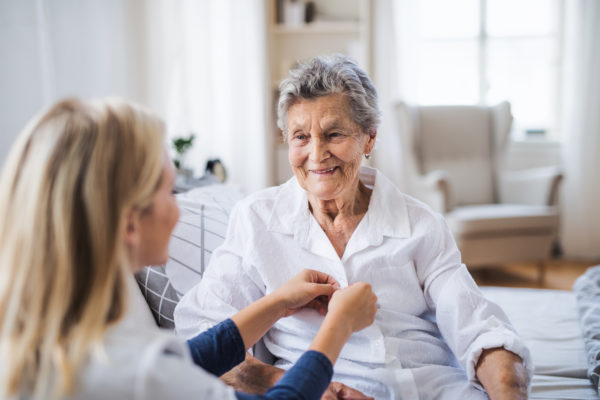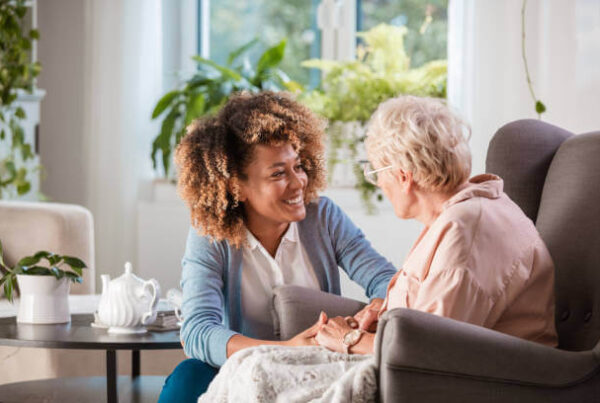Most people feel the safest and most comfortable at home. That’s especially true for seniors who want to remain in their homes while retaining as much independence as possible. Safety in the home for elderly people is an often overlooked aspect of remaining in the home, and it’s of particular concern for anyone that’s vulnerable or lives with physical or mental health disabilities.
To help you keep your loved one’s home as safe as possible, we’re providing this housing safety checklist to help ensure safe living for seniors:
- Eliminate fire hazards
✔ Check batteries in smoke detectors and carbon monoxide detectors
✔ Inspect electrical cords for signs of fraying
✔ Inspect power strips for overloading
✔ Assess the risks of candles, space heaters, and electric blankets
- Evaluate the potential for fall risks
✔ Remove throw rugs or add non-slip backings
✔ Clear clutter from traffic patterns
✔ Rearrange furniture to widen walkways
✔ Eliminate electrical cords if possible
✔ Invest in non-slip indoor shoes
- Reduce bathroom hazards
✔ Install grab bars in the bath/shower area and near the toilet
✔ Evaluate the need and benefit of replacing tubs with a walk-in shower
✔ Install a bathing chair into the shower
✔ Install a disability-friendly, raised toilet bowl
✔ Add rubber mats to the tub, shower, and floor area to prevent slippage
- Make improvements to the overall living space.
✔ Consider adding a stairlift for seniors that have trouble navigating stairs
✔ Add a peephole to the front door
✔ Install bright lighting around the home and consider installing motion-activated exterior lighting
✔ Add nightlights in hallways and in the bathrooms
Seniors living with dementia or Alzheimer’s disease may need additional safety measures, and we’ll review an elderly home safety checklist for them next.
Home Safety Tips for Seniors with Dementia
Dementia often comes on gradually. While people living with dementia may be able to safely live independently for a time, memory loss can increase safety concerns over time.
See this valuable home safety for the elderly checklist for seniors living with dementia:
- Replace outdated appliances with those that have automatic shutoff features
- Install hidden gas valves and circuit breakers to ensure that ovens and fireplaces don’t stay on for long periods
- Cover light sockets and light switches with safety locks
- Install finger guards on garbage disposals
- Install locks on drawers and cabinets that store knives, cleaning supplies, and medications
- Lock garages and basements that have safety hazards like harmful chemicals or machinery.
- Install deadbolts to prevent seniors from wandering aimlessly outdoors
- Remove locks from bathrooms and bedrooms to prevent seniors from locking themselves in accidentally
- Clear paths from obstructions or clutter to allow for easy mobility
- Explore options for technology such as a GPS or activity tracker
When it comes to safe senior living, it’s best to be proactive about addressing safety risks. Consider hiring a caregiver — even relatively brief visits from a professional in-home care provider can go a long way in helping seniors remain safely in their homes.
Be Proactive with Home Safety for Seniors
It can be easy for seniors to remain in their comfort zone, overlooking everyday safety concerns. The time to act is before something unsafe happens. That requires seniors and their loved ones to proactively take precautions to reduce risks.
A common risk for seniors is falling. Falls can cause serious injury risks. Many of the things you can do are simple and easy to change. By starting with smaller things like installing grab bars, adding non-slip mats, and ensuring adequate lighting, you may be able to avoid major, expensive renovations.
We suggest enlisting the help of a certified home safety specialist to help you identify safety concerns you may have missed and give you suggestions for how to set up your senior’s home safely and keep it that way. Alternatively, consider a reputable in-home care provider — a little help at home can dramatically improve a senior’s health, both mental and physical. Hiring a qualified home caregiver by Advanced Care is one of the best steps you can take to keep your loved one safe.
Any Home Is Adaptable for Elderly Safety
Despite the uniqueness of each dwelling, every home can be adapted to allow an elderly person to reside safely at home. Accessibility devices like chair lifts for getting upstairs and exterior door ramps for getting in and out of the house are simple fixes for any household. Elevators might be a good option for people that have larger budgets and the space to accommodate them.
Another home safety checklist for older adults includes the following modifications for your consideration:
- Replacing door knobs with levered handles
- Raising electrical outlets
- Widening doorways
- Adding railing
It’s essential to continually evaluate safety risks for seniors as their needs are continually changing due to aging. Our caregivers at Advanced Care will help you to identify safety risks in the home and help you access the necessary resources to make improvements. Often, it takes just a few upgrades or modifications to provide safe and comfortable living conditions. Don’t hesitate to call on Advanced Care. to 262-236-9194 or email us to: inquiries@advancedcare.health We’re happy to help!





